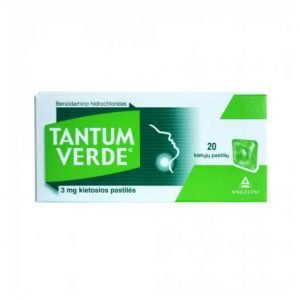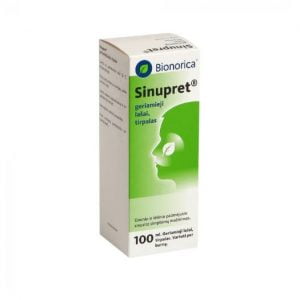Name of the medical product
Otrivin Menthol (without preservative) 1.0 mg/ml nasal spray, solution
Qualitative and quantitative composition
1 ml of Otrivin Nasal Spray contains 1.0 mg xylometazoline hydrochloride.
For the full list of excipients, see 6.1.
Pharmaceutical form
Nasal spray, solution.
Clinical particulars
Therapeutic indications
Rhinitis. For decongestion in sinusitis and for facilitating rhinoscopy.
Posology and method of administration of Otrivin Nasal Spray
Adults and children above twelve years of age:
One application in each nostril as required 2-3 times daily for a maximum of ten days.
Before the first application of Otrivin Nasal Spray, it is essential to prime the pump by actuating it four times. Once primed, the pump will typically remain charged throughout regular daily treatment periods. However, if the Otrivin Nasal Spray does not eject during the full actuation stroke or if the product has not been used for longer than six days, it will be necessary to re-prime the pump with four actuations as initially performed.
Each metered-dose spray delivers 0.14 ml per actuation (0.14 mg of xylometazoline hydrochloride).
Otrivin Menthol is not recommended for use in children below 12 years of age due to insufficient data on safety . It is recommended to make the last application shortly before retiring to bed.
Contraindications
Hypersensitivity to xylometazoline hydrochloride or to menthol or any of the other excipients.Narrow angle glaucoma. After transsphenoidal hypophysectomy or surgery exposing the duramater. Patients with rhinitis sicca or atrophic rhinitis.
Special warnings and precautions for using Otrivin Nasal Spray
Exercise caution when using Otrivin Menthol in patients who are sensitive to adrenergic substances, as it may result in symptoms such as sleep disturbances, dizziness, tremors, cardiac arrhythmias, or elevated blood pressure. Moreover, Otrivin should be used with caution in the following situations:
- patients with hypertension, cardiovascular disease. Patients with long QT syndrome treated with xylometazoline may be at increased risk of serious ventricular arrhythmias
- patients with hyperthyroidism, diabetes mellitus, phaeochromocytoma
- patients with prostatic hypertrophy
- patients treated with monoamine oxidase inhibitors (MAOI) or who have received them in the last two weeks
Otrivin should be used for a maximum of ten successive days in order to avoid a rebound effect in form of nasal congestion and drug-induced rhinitis, which may lead to physical drug dependence and/or atrophy of the nasal mucosa.
Instillation of decongestant preparations containing menthol directly into the nostrils of infants and young children must be avoided, as it has resulted in acute respiratory distress with cyanosis and respiration arrest. Do not exceed the recommended dose, especially in children and in the elderly.
Otrivin Menthol should not be used in children aged less than 12 years.
Pregnancy and lactation
Pregnancy
In view of its potential systemic vasoconstrictor effect it is advisable to take the precaution of not using Otrivn Menthol during pregnancy.
Lactation
It is not known if xylometazoline is excreted in breast milk, therefore caution should be exercised and Otrivin Menthol should be used only under medical advice while breast-feeding.
Fertility
There are no adequate data for the effects of Otrivin on fertility and no animal studies areavailable. As the systemic exposure to xylometazoline hydrochloride is very low, effects on fertility are therefore very unlikely.
Effects on ability to drive and use machines
Not applicable.
Undesirable effects
Adverse reactions are listed below, by system organ class and frequency. Frequencies aredefined as: very common (≥1/10), common (≥1/100 to <1/10), uncommon (≥1/1,000 to<1/100), rare (≥1/10,000 to <1/1,000), very rare (<1/10,000) or not known (cannot be estimatedfrom the available data). Within each frequency grouping, undesirable effects are presented in order of decreasing seriousness.
Immune system disorders:
Not known: Hypersensitivity reaction (angioedema, rash, pruritus)
Nervous system disorders
Common: Headache
Eye disorders
Not known: Visual impairment
Cardiac Disorders
Not known: Heart rate irregular and heart rate increased
Respiratory, thoracic and mediastinal disorders
Common: Nasal dryness or nasal discomfort, burning sensation
Very rare: Rebound congestion
Gastrointestinal disorders
Common: Nausea
Investigations
Not known: Furthermore, there may be an increased risk of elevated blood pressure.
Reporting of suspected adverse reactions is of utmost importance. It enables the ongoing monitoring of the benefit/risk balance of the medicinal product. Healthcare professionals are specifically requested to report any suspected adverse reactions through the national reporting system.
Overdose
Toxicity:
Moreover, it is worth noting that 2.5 mg per os in two- to three-year-olds caused mild intoxication. Additionally, eight drops of a 0.1% solution nasally administered to a nine-month-old infant resulted in mild intoxication. Furthermore, administering three times the adult dose nasally to a one-month-old infant led to moderate to severe intoxication.
Symptoms:
Excessive administration of topical xylometazoline hydrochloride or accidental ingestion may give rise to a range of symptoms. These include severe dizziness, perspiration, headache, respiratory depression, coma, seizures, hypothermia, hypertension, peripheral vasoconstriction, cold extremities, bradycardia, mydriasis, bronchospasm, and convulsions. It is important to note that hypertension may be followed by hypotension. Additionally, it should be noted that small children are more susceptible to toxicity than adults.
Treatment:
If an overdose occurs, medical supervision is essential to initiate appropriate supportive measures. These measures typically involve observing the individual for several hours. In specific situations, medical professionals may administer activated charcoal. Additionally, it is crucial to closely monitor respiration and circulation, and supplemental oxygen and a respirator may be necessary. In the case of a seizure, administering appropriate anticonvulsant therapy, such as diazepam, is recommended.
PHARMACEUTICAL PARTICULARS
List of excipients
Menthol, cineole, disodium edetate, sodium dihydrogen phosphate dihydrate, disodium phosphate dodecahydrate, sodium chloride, sorbitol, macrogol glycerol hydroxystearate, purified water.
The contents are free from preservatives.
Incompatibilities
Not applicable.
Shelf life
30 months.
Special precautions for storage
Do not store above 25° C.








Bjorn –
Takk